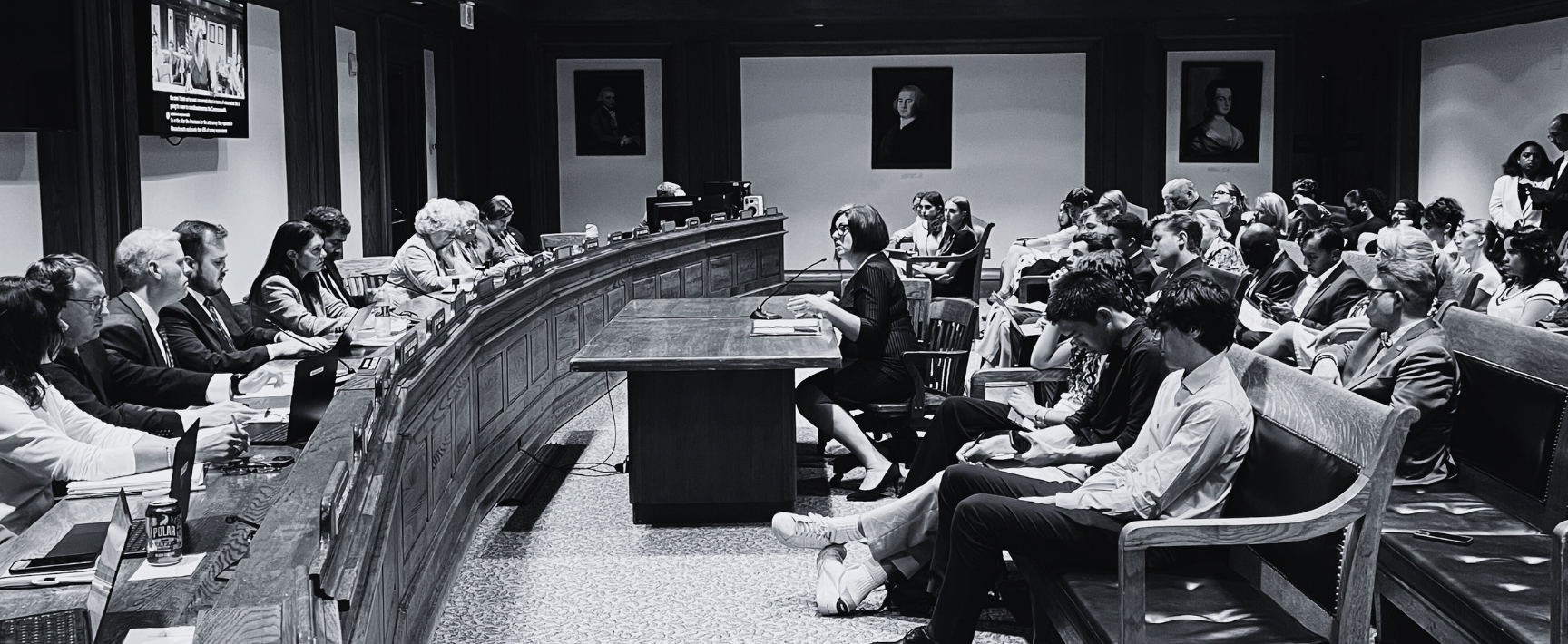STATE AND REGIONAL SECTOR LEADERS TESTIFY ON $2.8M IN TERMINATED NEA, NEH, AND IMLS GRANTS
Image features Emily Ruddock, Executive Director of MASSCreative, testifying at the Massachusetts State House on the impacts of federal funding cuts to arts and culture in the Commonwealth.
BOSTON (7/16/25) - On Tuesday, July 15, 2025, the House Committee on Federal Funding, Policy and Accountability held an oversight hearing by invitation to learn how recent federal funding cuts and the proposed elimination of federal arts agencies is impacting the creative sector in Massachusetts and communities that cultural organizations serve. MASSCreative, Mass Cultural Council, Mass Humanities, New England Foundation for the Arts, New England Museum Association, and other local, state, and regional cultural organizations were invited to testify before the House Committee and their guests from the Joint Committee on Tourism, Arts and Cultural Development.
In January, President Trump signed three executive orders that had immediate impacts on the arts, culture, and tourism sectors: “Ending Radical and Wasteful Government DEI Programs and Preferencing,” “Defending Women from Gender Ideology Extremism and Restoring Biological Truth to the Federal Government,” and “Ending Illegal Discrimination and Restoring Merit-Based Opportunity.”
These executive orders required federal agencies to assess all funding and grants to ensure compliance, while the Department of Government Efficiency deployed teams to eliminate spending across the federal government. Consequently, grants through the National Endowment for the Humanities (NEH), Institute of Museum and Library Services (IMLS), and National Endowment for the Arts (NEA) were suddenly rescinded and terminated. Further, the Trump Administration proposed eliminating the NEA, NEH, and IMLS in their federal budget for Fiscal Year 2026.
“The loss of terminated NEH dollars is already being felt in Massachusetts. NEH grants for fellowships, stipends, and K-12 teachers institutes bring hundreds of people to Massachusetts to study here each year. A $381K grant to the American Antiquarian Society in Worcester for fellowships: cancelled. A $184,866 grant to the New Bedford Historical Society for a K-12 teacher institute on the city’s role in the Underground Railroad: cancelled. A $750,000 infrastructure grant to GBH: cancelled. A $39,000 in funding for the Porter Phelps-Huntington house museum in Hadley: cancelled.”
“The federal impact cannot be overstated. In Massachusetts, over 1,600 school, public, academic and special libraries from across the state benefit from federal IMLS funding. Millions of people rely on federally funded library services. In the last economic downturn, Massachusetts libraries experienced double digit percentage increases in the number of people coming through their doors. The MBLC’s statewide services helped libraries meet the demand, but that was before federal uncertainty threatened what is arguably one of the best library systems in the nation.
”
The Massachusetts creative sector generates $29.7 billion in economic value annually, supports 130,263 jobs in the Commonwealth, and accounts for 4% of the state’s GDP. Nationally, arts and cultural industries contribute $1.17 trillion annually and account for 4.2% of United States’ GDP. These sectors are critical for animating main streets and stimulating local, regional, and global economies. The creative economy is crucial for stimulating broader economic growth and vitality: the 2022 Arts and Economic Prosperity 6 (AEP6) study assessing the economic impact of nonprofit arts and culture organizations and event-related spending in Springfield found that people who attended cultural events spent an average of $31.85 per person on event-related purchases such as parking and dining, while those who traveled from outside counties spent an average of $51.83 per person. Divestments from the creative economy divert revenues away from other sectors supporting local economies.
“The cultural sector generates nearly $30 billion annually for the Commonwealth’s economy, accounting for 4% of our state GDP and supporting more than 130,000 jobs. Arts and culture, the humanities, and the interpretive sciences are not only vital economic drivers, they are the heart of what makes Massachusetts a vibrant, innovative, and inspiring place to live, work, and visit. We thank the House Committee on Federal Funding, Policy & Accountability for convening this crucial discussion. Understanding and documenting the full impact of these lost federal funds is essential, as these cancelled investments will have real and lasting consequences for cultural organizations and the communities they serve.
”
A combination of public-private funding sources support the Massachusetts arts and cultural sector. Public investments to non-profits from federal, state, and local governments play an essential role in stabilizing programming, leveling opportunities for non-profits to apply for funding, and position non-profits to pursue private funding matches. The rescission of grants exacerbates resource divisions across the sector and places additional strain on private philanthropy at a time when other sectors also need to replace terminated federal funding.
“Federal funding, particularly NEA funding, acts as a catalyst for additional support. Every $1 of NEA funding leverages $9 in private and public dollars. By providing a seal of approval and demonstrating a commitment to the arts, federal funding inspires foundations, corporations, and individual donors to invest in cultural organizations and projects. Cuts in federal funding will jeopardize this leveraging effect, leading to a significant decline in overall arts support.
”
In May, MASSCreative conducted a regional impact survey on rescinded NEA, NEH, and IMLS grants, in partnership with Arts4NH, CT Arts Alliance, and the Cultural Alliance of Maine. In total, 89 organizations responded to the survey. Of those responses, 38 are from Massachusetts-based organizations. The survey revealed the following:
Organizations reported a total of $2,789,161 in grants rescinded in Massachusetts
Respondents reported that 40 grants were rescinded: 72.5% from the NEA and 20% from the NEH. One respondent reported a rescinded grant from IMLS.
94.7% of organizations were using their grants to support jobs. A total of 621 jobs in total were fully or partially supported by rescinded grants.
76.3% of organizations had not yet received their full grant when they received notice that they would be rescinded. These organizations reported that they had spent a total of $1,006,359 that would not be reimbursed.
70% or more of these organizations offer programs supporting youth and students (83.3%), BIPOC communities (83.3%), and urban communities (69.4%).
33.3% of organizations support rural communities and aging populations.
These organizations also support veterans, members of the disabilities community, and other vulnerable populations.
The most impacted congressional district is Congresswoman Ayanna Pressley’s (MA-07) with 15 canceled grants.
“Changes in funding for any sector causes disruption; however, the swift and violent cancellation of federal funding already promised will have a ripple effect far beyond the walls of our libraries, cultural organizations and arts spaces. We will feel the loss of after-school arts programming that keeps our kids engaged, the canceled festivals in our main streets that put dollars in the registers of our favorite local diners, and lack of access to information through databases, free internet and e-books that aren’t freely available.”
Testimony at the oversight hearing highlighted not only the financial instability caused by federal grant terminations and rescissions, but also a chilling effect on creative expression caused by recent Executive Orders and federal grant conditions: 40% of Massachusetts respondents reported uncertainty or intent not to apply for the next NEA grant cycle due to requirements related to "gender ideology" certifications. 35% of organizations altered or self-censored programming out of fear of negative government funder consequences. Organizations also reported general anxiety about future funding and creative freedom as a consequence.
“Federal funding provides an influx of opportunities that allow us to gather in third spaces, build and strengthen community bonds. Museums and institutions have always managed to do so much with very little support, however in this current political climate, this is an expectation that can no longer be accepted. Culture matters. It heals and strengthens us. The people that work in museums and institutions are passionate and dedicated people who do this work because they truly love it and these federal cuts put their livelihoods at risk.”
MASSCreative, Mass Cultural Council, Mass Humanities, New England Foundation for the Arts, New England Museum Association, and others who testified urged members of the Legislature to support the sector amidst these cuts by safeguarding artistic freedom from political interference and establishing state contingency funds to offset cancelled federal grants.

